Ecological Society of America announces 2021 Fellows
March 25, 2021
For Immediate Release
Contact: Heidi Swanson, (202) 833-8773 ext. 211, gro.asenull@idieh
The Ecological Society of America (ESA) is pleased to announce its 2021 Fellows. The Society’s fellowship program recognizes the many ways in which its members contribute to ecological research and discovery, communication, education and pedagogy, and management and policy.
Fellows are members who have made outstanding contributions to a wide range of fields served by ESA, including, but not restricted to, those that advance or apply ecological knowledge in academics, government, non-profit organizations, and the broader society. They are elected for life.
Early Career Fellows are members within eight years of completing their doctoral training (or other terminal degree) who have advanced ecological knowledge and applications and show promise of continuing to make outstanding contributions to a wide range of fields served by ESA. They are elected for five years.
ESA established its Fellows program in 2012 with the goal of honoring its members and supporting their competitiveness and advancement to leadership positions in the Society, at their institutions, and in broader society. Past ESA Fellows and Early Career Fellows are listed on the ESA Fellows page.
Fellows elected in 2021 in recognition of their contributions to the science of ecology:
 Brendan J. M. Bohannan, Professor, University of Oregon, Department of Biology
Brendan J. M. Bohannan, Professor, University of Oregon, Department of Biology
Elected for fundamental contributions to the unification of microbiology and ecology that show that ecological principles developed for macroorganisms (in biodiversity, biogeography and community assembly sciences) also apply to microbial life; for exceptional mentorship of a generation of microbial ecologists; and for exceptional service on ESA’s governing council and as journal editor.
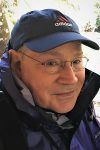 Thomas W. Boutton, Regents Professor and Sid Kyle Endowed Chair, Texas A&M University, Department of Ecology and Conservation Biology
Thomas W. Boutton, Regents Professor and Sid Kyle Endowed Chair, Texas A&M University, Department of Ecology and Conservation Biology
Elected for outstanding scholarly contributions that have advanced understanding of the structure and function of grassland and savanna ecosystems, and for revealing how land cover and land-use changes in those systems have modified key biogeochemical processes in the carbon, nitrogen and phosphorus cycles at multiple scales.
 Mary L. Cadenasso, Professor, University of California, Davis, Department of Plant Sciences
Mary L. Cadenasso, Professor, University of California, Davis, Department of Plant Sciences
Elected for definitive contributions in urban ecology and landscape ecology, including discoveries on the social-natural hybridity of urban land covers; on the structure, function, and theory of ecological boundaries and on ecosystem function in heterogeneous systems that have informed management, policy and environmental justice in cities and conservation lands.
 Brenda B. Casper, Professor, University of Pennsylvania, Department of Biology
Brenda B. Casper, Professor, University of Pennsylvania, Department of Biology
Elected for decades of contributions to ecological understanding in plant reproductive ecology, population biology, and foundational work in plant-soil feedbacks; for mentoring and training experimental ecologists; and for leadership positions enhancing science communication and undergraduate education.
 Ferran Garcia-Pichel, Professor, Arizona State University, School of Life Sciences
Ferran Garcia-Pichel, Professor, Arizona State University, School of Life Sciences
Elected for contributions to the understanding of the roles of microbes and their activities in ecological processes present, past and future, and for opening the microbial black box to reveal the rich natural history of important microbes.
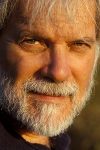
Steven N. Handel, Distinguished Professor of Ecology and Evolution, Rutgers, The State University of New Jersey, Department of Ecology, Evolution, and Natural Resources
Elected for contributions in urban restoration ecology, including research on opportunities and methods for adding ecological enhancements to degraded areas; for building important bridges to the landscape architecture profession in prize-winning public projects; and for revising university curricula to better incorporate ecological concepts into landscape design practices.
 Jessica J. Hellmann, Executive Director and Professor, University of Minnesota, Institute on the Environment and Department of Ecology, Evolution, and Behavior
Jessica J. Hellmann, Executive Director and Professor, University of Minnesota, Institute on the Environment and Department of Ecology, Evolution, and Behavior
Elected for her research contributions to understanding global change ecology and adaptation of human and natural systems to climate change.
 Karen D. Holl, Professor, University of California, Santa Cruz, Environmental Studies
Karen D. Holl, Professor, University of California, Santa Cruz, Environmental Studies
Elected for pathbreaking contributions to the science and practice of restoration ecology, including long-term experiments that place restoration efforts into a landscape context; and for leadership in international training, including an exceptional primer on restoration, bringing science into decision making, and effective communication about the importance of restoring ecosystems.
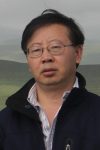 Shuijin Hu, Professor, North Carolina State University, Department of Entomology and Plant Pathology
Shuijin Hu, Professor, North Carolina State University, Department of Entomology and Plant Pathology
Elected for influential research in the fields of plant–microbe interactions, ecosystem ecology and global change ecology, and for his dedication to pedagogy.
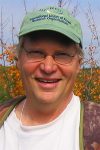 Louis R. Iverson, Landscape Ecologist, USDA Forest Service, Northern Research Station and Northern Institute of Applied Climate Science
Louis R. Iverson, Landscape Ecologist, USDA Forest Service, Northern Research Station and Northern Institute of Applied Climate Science
Nominated for creative and insightful research in restoration ecology and in understanding potential impacts of climate change on forest species; for the practical implementation of this research for management of national environmental problems; and for leadership in putting the field of landscape ecology on a firm footing.
 Josh Lawler, Professor, University of Washington, School of Environmental and Forest Sciences
Josh Lawler, Professor, University of Washington, School of Environmental and Forest Sciences
Elected for broadening understanding of the effects of landscape and climate change on biological diversity; for educating students and serving society in ways that have increased recognition of ecological science and the connection between nature and human health; and for mentoring the next generation of ecologists.
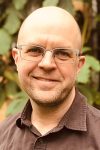 Jay T. Lennon, Professor, Indiana University, Department of Biology
Jay T. Lennon, Professor, Indiana University, Department of Biology
Elected for substantial contributions to the understanding of the ecology and evolution of microbial communities and their relationship to ecosystem function, notably the importance of dormancy as a mechanism that maintains microbial diversity; leadership in developing a research vision to bridge the disciplines of microbiology and macroecology; and interdisciplinary service and mentorship of junior researchers.
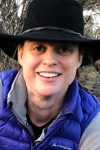 Margaret (Margie) M. Mayfield, Professor, University of Queensland, School of Biological Sciences
Margaret (Margie) M. Mayfield, Professor, University of Queensland, School of Biological Sciences
Elected for research that spans basic and applied ecological questions, including pollinator contributions to ecosystem services, the importance of considering functional traits in restoration of tropical forests and climate change responses, and the factors contributing to the coexistence of species.
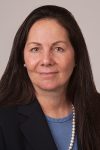 Laura A. Meyerson, Professor, University of Rhode Island, Department of Natural Resources Science
Laura A. Meyerson, Professor, University of Rhode Island, Department of Natural Resources Science
Elected for leadership in invasion science, including research on the biotic and abiotic underpinnings of biological invasions at multiple scales; for contributions to national and international policy through her publications and extensive service; and for training the next generation of leaders through teaching, mentoring, and action.
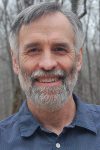 William F. Morris, Professor, Duke University, Biology Department
William F. Morris, Professor, Duke University, Biology Department
Elected for contributions to empirical and theoretical understanding of population dynamics and species interactions; for research that has grounded conservation biology with more careful and rigorous analysis methods; and for providing insights into the dynamics and evolution of species interactions.
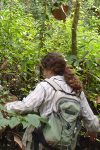 Rebecca Ostertag, Professor, University of Hawaii at Hilo, Department of Biology, Tropical Conservation and Environmental Science MS Program
Rebecca Ostertag, Professor, University of Hawaii at Hilo, Department of Biology, Tropical Conservation and Environmental Science MS Program
Elected for outstanding intellectual leadership in the areas of tropical forest ecology and conservation and a deep commitment to mentoring and enhancing diversity in the next generation of ecologists.
 Ingrid M. Parker, Professor, University of California, Santa Cruz, Department of Ecology and Evolutionary Biology
Ingrid M. Parker, Professor, University of California, Santa Cruz, Department of Ecology and Evolutionary Biology
Elected for seminal contributions to understanding the ecological and evolutionary processes surrounding biological invasions, and the legacies of such invasions in natural ecosystems; for service to numerous non-academic consortia and organizations addressing conservation and ecosystem management; for fostering diversity and inclusion; and for service to the Ecological Society of America.
 Pedro R. Peres-Neto, Professor and Canada Research Chair in Spatial Ecology and Biodiversity, Concordia University, Department of Biology
Pedro R. Peres-Neto, Professor and Canada Research Chair in Spatial Ecology and Biodiversity, Concordia University, Department of Biology
Elected for innovative research in aquatic science, spatial ecology and multivariate statistics; for leadership and editorial service in scientific societies; and for international collaboration and outreach.
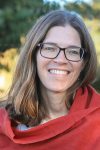 Stacy Philpott, Professor and Ruth & Alfred Heller Endowed Chair in Agroecology, University of California, Santa Cruz, Environmental Studies
Stacy Philpott, Professor and Ruth & Alfred Heller Endowed Chair in Agroecology, University of California, Santa Cruz, Environmental Studies
Elected for outstanding and substantial contributions to the field of ecology, especially in the areas of agroecology, trophic interactions, community assembly, insect ecology, and relationships between biodiversity and ecosystem services; and for significant contributions in teaching, mentoring, curriculum development, and promoting women and students of color.
 Pej Rohani, Regents’ Professor, University of Georgia, Odum School of Ecology, Department of Infectious Diseases, and Institute of Bioinformatics
Pej Rohani, Regents’ Professor, University of Georgia, Odum School of Ecology, Department of Infectious Diseases, and Institute of Bioinformatics
Elected for using long-term spatio-temporal epidemiological data to test and examine ecological theory, while simultaneously applying ecological concepts and perspectives to enhance understanding of transmission dynamics and improve human health.
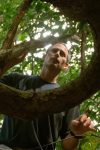 Stefan Schnitzer, Professor, Marquette University, Department of Biological Sciences
Stefan Schnitzer, Professor, Marquette University, Department of Biological Sciences
Elected for outstanding contributions to tropical forest community and ecosystems ecology through groundbreaking research on lianas, for exceptional mentoring of junior scientists, and for being a generous collaborator.
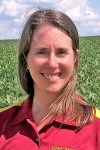 Lisa Schulte Moore, Professor, Iowa State University, Natural Resource Ecology and Management
Lisa Schulte Moore, Professor, Iowa State University, Natural Resource Ecology and Management
Elected for contributions to sustainable agriculture and landscape diversity, especially for pioneering strategies that foster wildlife conservation, reduced soil erosion, and improved water quality in agricultural regions.
 Bradford P. Wilcox, Professor, Texas A&M University, Department of Ecology and Conservation Biology
Bradford P. Wilcox, Professor, Texas A&M University, Department of Ecology and Conservation Biology
Elected for research elucidating causes and consequences of vegetation change on the ecohydrology of savannas and woodlands, including field studies conducted in North, Central and South America that have provided a deeper understanding of hydrological and other ecosystem changes during woody plant encroachment in semiarid regions.
 Rachael Winfree, Professor, Rutgers University, Department of Ecology, Evolution, and Natural Resources
Rachael Winfree, Professor, Rutgers University, Department of Ecology, Evolution, and Natural Resources
Elected for excellence in research on the relationship between biodiversity and ecosystem function in real-world systems; the ecology of pollinators and pollination; and how both are affected by global environmental change.
 Amy E. Zanne, Associate Professor, George Washington University, Department of Biological Sciences
Amy E. Zanne, Associate Professor, George Washington University, Department of Biological Sciences
Elected for building a trait-based conceptual framework of plant ecology and evolution, extending trait-based theory to wood dynamics and fungi, building trait databases of tremendous value to the scientific community, and fostering a new generation of collaboration networks in trait-based ecology.
Early Career Fellows (2021 – 2025) elected for advancing the science of ecology and showing promise for continuing contributions:
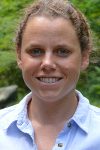 Caroline E. Farrior, Assistant Professor, University of Texas at Austin, Department of Integrative Biology
Caroline E. Farrior, Assistant Professor, University of Texas at Austin, Department of Integrative Biology
Elected for advancing understanding of how individual-based competition influences plant strategies, forest dynamics and ecosystem-level carbon storage, and for facilitating the use of this knowledge in public policy.
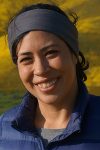 Loralee Larios, Assistant Professor, University of California, Riverside, Department of Botany and Plant Sciences
Loralee Larios, Assistant Professor, University of California, Riverside, Department of Botany and Plant Sciences
Elected for innovative research in plant community ecology, emerging leadership in restoration ecology, exceptional outreach and community engagement, and significant work on diversifying the discipline of ecology.
 Nathan P. Lemoine, Assistant Professor, Marquette University, Department of Biological Sciences
Nathan P. Lemoine, Assistant Professor, Marquette University, Department of Biological Sciences
Elected for integrating ecophysiology into community ecology to provide mechanistic predictions for how climate change will impact ecosystem structure and function, and for his advocacy to improve statistical practices in ecology.
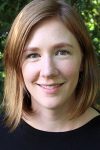 Jaclyn Hatala Matthes, Assistant Professor, Wellesley College, Department of Biological Sciences
Jaclyn Hatala Matthes, Assistant Professor, Wellesley College, Department of Biological Sciences
Elected for contributions to the understanding of how feedbacks between climate change, land-use change, and ecosystem processes influence carbon cycling across a variety of systems, and her exceptional mentorship and teaching at the graduate and undergraduate level.
 Desiree L. Narango, Postdoctoral Fellow, University of Massachusetts, Amherst, Biology Department
Desiree L. Narango, Postdoctoral Fellow, University of Massachusetts, Amherst, Biology Department
Elected for pioneering research on the connections between native plants, insects and birds in human-dominated urban and agricultural ecosystems; for excellence in communicating ecological concepts and the importance of native plants to the urban public; and for promoting diversity and inclusion in ecology.
 Julian Resasco, Assistant Professor, University of Colorado, Ecology and Evolutionary Biology Department
Julian Resasco, Assistant Professor, University of Colorado, Ecology and Evolutionary Biology Department
Elected for outstanding contributions toward advancing ecological understanding of human impacts on biodiversity and species interactions, including spatial and temporal dynamics and responses to landscape connectivity and fragmentation; and for his commitment to mentoring and promoting diversity and inclusion in ecology.
 Lauren G. Shoemaker, Assistant Professor, University of Wyoming, Department of Botany
Lauren G. Shoemaker, Assistant Professor, University of Wyoming, Department of Botany
Elected for research advancing the ways we make sense of complex ecological systems, integrating theory and empiricism, and applying theory to real-world problems; for leadership in collaborative science; and for dedicated and innovative teaching and mentoring.
 Adrian C. Stier, Associate Professor, University of California, Santa Barbara, Department of Ecology, Evolution, and Marine Biology
Adrian C. Stier, Associate Professor, University of California, Santa Barbara, Department of Ecology, Evolution, and Marine Biology
Elected for innovative contributions to marine population and community ecology, integration of community ecology with ecosystem-based management to advance the recovery of marine food webs, novel perspectives on ecosystem resilience in the Anthropocene, and commitment to community engagement in natural resource management.
 Jennifer M. Sunday, Assistant Professor, McGill University, Department of Biology
Jennifer M. Sunday, Assistant Professor, McGill University, Department of Biology
Elected for contributions to understanding the relative roles of climate, physiology, and species’ interactions upon biogeographical ranges and changes in biodiversity; and for advancing understanding of ecological change and climate change responses using analyses of biogeography through time and comparative traits.
 Kai Zhu, Assistant Professor, University of California, Santa Cruz, Environmental Studies
Kai Zhu, Assistant Professor, University of California, Santa Cruz, Environmental Studies
Elected for outstanding contributions to research, teaching, and service in the fields of global change ecology, ecological modeling, and environmental data science.
##
Learn more about the August 2–6, 2021 ESA Annual Meeting on the meeting website.
ESA invites press and institutional public information officers to attend for free. To register, please contact ESA Public Information Manager Heidi Swanson directly at gro.asenull@idieh. Same-day registration will be available during the meeting.
###
The Ecological Society of America, founded in 1915, is the world’s largest community of professional ecologists and a trusted source of ecological knowledge, committed to advancing the understanding of life on Earth. The 9,000 member Society publishes five journals and a membership bulletin and broadly shares ecological information through policy, media outreach, and education initiatives. The Society’s Annual Meeting attracts 4,000 attendees and features the most recent advances in ecological science. Visit the ESA website at https://ecologicalsocietyofamerica.org.